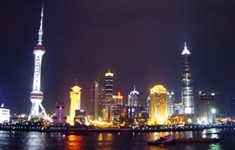
Company founder and CEO, He Qiang, plans to double the number of Qing Xiang Ge outlets to 30 restaurants by 2020, with three distribution centers and four staff training centers nationally.
“I’m so busy I barely have time to talk…I don’t even need to advertise,” He Qiang told SeafoodSource.
Having started the business with his two brothers in 1992, by 2004 He Qiang had the biggest Halal-compliant restaurant business in northerly Heilongjiang province before expanding into the Beijing market in 2005. One of the latest outlets to open in the capital, the Jin De Qiao branch, opened in 2011 and spans 2,200 meters, can accommodate 500 people dining, with 20 private rooms. His 1,500 square-meter restaurant in Fuchengmen on the city’s west side seats 500 people.
The restaurant, he said, is unique in incorporating an R&D center, a staff training center and a distribution center which together facilitate rapid national expansion. Likewise, he’s proud of having designed the restaurants himself.
Value is another core value for He Qiang who remains keen to cater to the emerging middle class demand for value prices, rather than catering to a nouveau riche taste for reef and other rare fish. The restaurant chain’s outlet on Dongdaqiao lu in Beijing’s business district recently ran a special buy-one-get-one-free offer on sturgeon: CNY 78.92 (USD 12.69, EUR 9.56) per 500 grams. Customers can watch the fish swim in large glass tanks. There’s a similar offering on Canadian crab — CNY 298 (USD 47.91, EUR 36.10)/500g. He Qiang offers abalone at CNY 14 (USD 2.25, EUR 1.70) per piece and shellfish at CNY 15 (USD 2.41, EUR 1.82).
Another national seafood restaurant chain aiming for the middle end of the market — likewise, with aggressive expansion plans — is the Aomen Dou Lao, named after a Macau-style seafood hotpot, the restaurant’s signature dish. Part of a conglomerate which also includes the Macao Dou Lao Leisure Club, a lifestyle venue for businessmen, the chain is headquartered in the prosperous city of Hangzhou, south of Shanghai. However it has spread inland, with four branches in Beijing and outlets in central provinces like Henan.
With 200 outlets in 23 provinces, Aomen Doulou clearly has significant scale and purchasing power in a country which still maintains a largely regional and fragmented food service sector. Headed by industrialist Wang Songyao, the chain serves imported oysters and crustaceans.
Locally-cultivated abalone ranges in price from CNY 10 (USD 1.61, EUR 1.21) to CNY 48 (USD 7.72, EUR 5.82) depending on size. Shrimp is served at CNY 58 (USD 9.33, EUR 7.03) per 500g and local scallop at CNY 5 (USD 0.80, EUR 0.61) per scallop while Chinese oysters are served at CNY 6 (USD 0.97, EUR 0.77) per piece. Aomen Dou Lou outlets also serve up salmon and tuna sashimi at CNY 38 (USD 6.11, EUR 4.60) per serving. Uniquely, the chain also operates a shop on the popular online shopping site, Tmall.com, to sell discount coupons entitling customers to discounts at its outlets.
Admired among local chefs (who tell of his regime of working through 150 kg of radish every day to practice his chopping skills) He Qiang says he’s going to first concentrate future openings on the north of the country. Part of China’s Hui Muslim minority, He Qiang believes he also been able to benefit from a perception that halal-style food catering is cleaner among Chinese diners, ever-wary of food safety. Most of China’s Muslim population is concentrated in the country’s northwest.
A local Hui Muslim food blogger, Abdullah Sha, took to his blog on Sina’s Twitter-style Weibo to write about Qing Xiang Ge: “The prices are reasonable but the portions are also moderate. The atmosphere is good.”
China has proven to be a lucrative but also fickle market for international fast-food chains. Yum! Brands this month scaled back its expectations for fourth-quarter 2012 China's same store sales to -4 percent, from a previous projection of flat or low single-digit growth. Likewise, the company announced that new restaurant opening growth would decelerate from 700 in 2013 to 800 in 2012. KFC has 3,700 stores in China, more than any other fast-food player here.
Dominant in the Chinese fast-food market — where it has outpaced locals and multinational peers — KFC has gotten bad press in China for its frequent price rises. However there are clearly possibilities for growth for the sector if one considers that for every million people in China there are only 3.5 YUM! restaurants, compared with 58 in the U.S.





